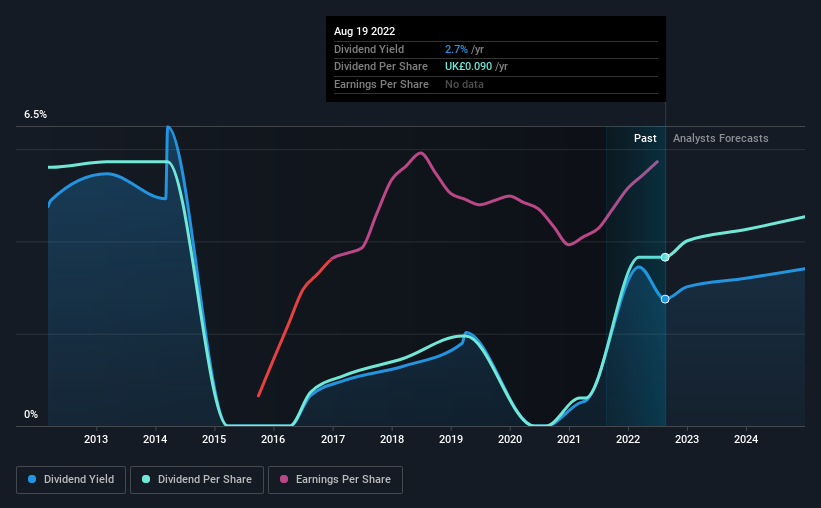- United Kingdom
- /
- Construction
- /
- LSE:BBY
Balfour Beatty's (LON:BBY) Shareholders Will Receive A Bigger Dividend Than Last Year

Balfour Beatty plc (LON:BBY) will increase its dividend on the 5th of December to £0.035, which is 17% higher than last year's payment from the same period of £0.03. Despite this raise, the dividend yield of 2.7% is only a modest boost to shareholder returns.
View our latest analysis for Balfour Beatty
Balfour Beatty's Earnings Easily Cover The Distributions
The dividend yield is a little bit low, but sustainability of the payments is also an important part of evaluating an income stock. Before making this announcement, Balfour Beatty was easily earning enough to cover the dividend. This means that most of its earnings are being retained to grow the business.
Looking forward, earnings per share is forecast to rise by 16.9% over the next year. If the dividend continues along recent trends, we estimate the payout ratio will be 33%, which is in the range that makes us comfortable with the sustainability of the dividend.

Dividend Volatility
The company's dividend history has been marked by instability, with at least one cut in the last 10 years. The annual payment during the last 10 years was £0.138 in 2012, and the most recent fiscal year payment was £0.09. Doing the maths, this is a decline of about 4.2% per year. Generally, we don't like to see a dividend that has been declining over time as this can degrade shareholders' returns and indicate that the company may be running into problems.
The Dividend Looks Likely To Grow
Growing earnings per share could be a mitigating factor when considering the past fluctuations in the dividend. Balfour Beatty has seen EPS rising for the last five years, at 55% per annum. Earnings have been growing rapidly, and with a low payout ratio we think that the company could turn out to be a great dividend stock.
We Really Like Balfour Beatty's Dividend
Overall, we think this could be an attractive income stock, and it is only getting better by paying a higher dividend this year. Distributions are quite easily covered by earnings, which are also being converted to cash flows. All of these factors considered, we think this has solid potential as a dividend stock.
Companies possessing a stable dividend policy will likely enjoy greater investor interest than those suffering from a more inconsistent approach. Still, investors need to consider a host of other factors, apart from dividend payments, when analysing a company. Case in point: We've spotted 3 warning signs for Balfour Beatty (of which 1 shouldn't be ignored!) you should know about. If you are a dividend investor, you might also want to look at our curated list of high yield dividend stocks.
Valuation is complex, but we're here to simplify it.
Discover if Balfour Beatty might be undervalued or overvalued with our detailed analysis, featuring fair value estimates, potential risks, dividends, insider trades, and its financial condition.
Access Free AnalysisHave feedback on this article? Concerned about the content? Get in touch with us directly. Alternatively, email editorial-team (at) simplywallst.com.
This article by Simply Wall St is general in nature. We provide commentary based on historical data and analyst forecasts only using an unbiased methodology and our articles are not intended to be financial advice. It does not constitute a recommendation to buy or sell any stock, and does not take account of your objectives, or your financial situation. We aim to bring you long-term focused analysis driven by fundamental data. Note that our analysis may not factor in the latest price-sensitive company announcements or qualitative material. Simply Wall St has no position in any stocks mentioned.
About LSE:BBY
Balfour Beatty
Balfour Beatty plc finances, designs, develops, builds, and maintains infrastructure in the United Kingdom, the United States, and internationally.
Good value with adequate balance sheet.
Similar Companies
Market Insights
Community Narratives



